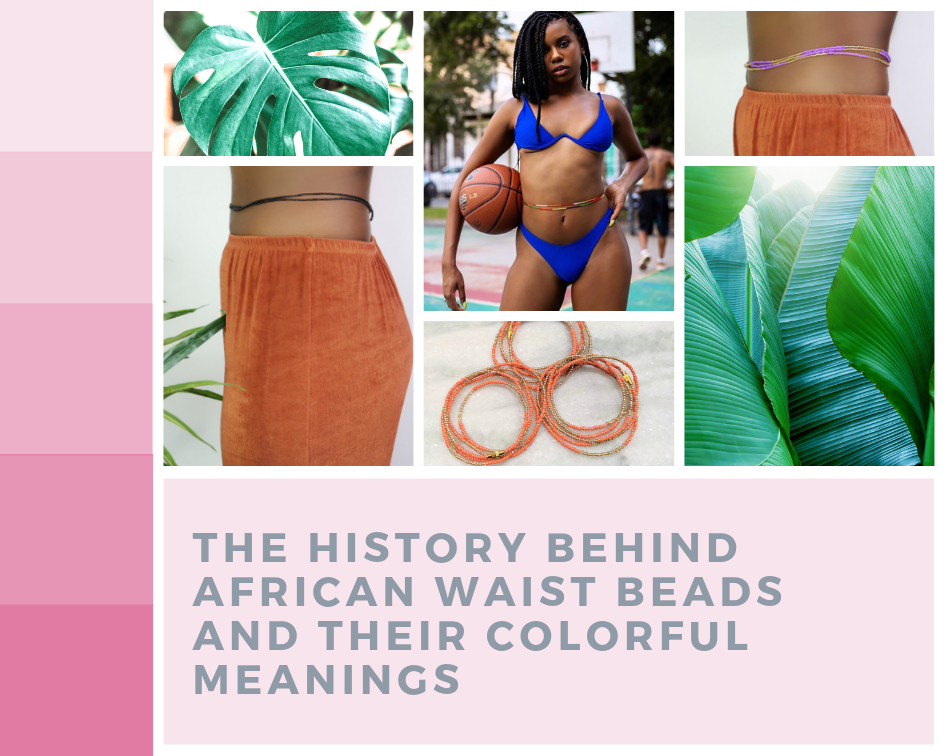by Nicole Gordon
History
You may have grown up around women that decorated their waists with beads made from seeds, glass beads, or crystals; perhaps you’ve seen one of your favorite influencers decoratively wearing beads around their waist too. From giving you awareness of how much weight you have lost to being a representation of a certain virtue, they are collectively a beautiful aspect of the feminine proclamation of self in several African cultures. They also serve as a form of stylistic expression as you can customize what colors you want to display, how many waist beads you want to stack, and what types of beads you want to use. These pieces stem from various areas of the Diaspora, ranging from Ghana’s Dipo ceremonies to Nigeria’s Yoruba tribe and those in between. Although trendy, African women have traditionally worn these beads as a symbol of femininity and prosperity for centuries. The history of waist beads can be traced back as early as the 15th century.
According to the Africa Facts Organization, “Jewelry in Africa is seldom just ornamental; rituals, religion and ceremonies play a large part.” With that said, there is such a large amount of influence that stems from cultural aspects and is concentrated in the colors of the beads.
Waist beads can even be traced back to ancient Egypt, as shown in Figure 1. Hieroglyphs depict dancers adorned with braids and waist beads.

Many people question when an appropriate time for waist beads is or if they should wear them at all. The decision to wear them is up to the individual and what occasion they choose. From going on a beach trip with your girls to walking into an interview and having them be a subtle reminder under your business wear. Angela Hill from the Bay Area News Group states, “They’re for you. It’s personal. The meaning of the colors varies with every tribe — it’s kind of like visual dialects. And here in America it’s certainly a form of personal expression and individual interpretation. They’re for all women — any body type, any race, any background.” The beads are customary for promoting fertility, womanhood, and power. Often, they can be associated with the country you choose to represent depending on the colors chosen (i.e. Nigeria - green and white). Whether you want to show them off or have them under your clothes as a less obvious reminder, they are unique to you. Culturally, African waist beads can have a sensual significance as well, for potential male suitors.
West Africa
One of the most beautiful aspects of waist beads is the prominence of individuality when choosing the colors and materials of the beads. For example, Ghanaian girls may be presented with waist beads as a token of their “coming-of-age” into womanhood. They can also represent what class a woman is in, her economic status, and fertility. Traditionally unmarried women of the Yoruba tribe wear an ileke, also known as waist beads or waist chains. Waist beads are romantic, fashionable and attract attention to the waist by making the waist appear slimmer and bringing out the curves of the hips. Modern-day wear includes decorative adornment and waist and weight management.
East Africa
According to Google Arts & Culture, “Glass beads were introduced on the east coast of Africa by Arab and (from the 16th to 18th centuries) Portuguese traders, and reached southern Africa in small quantities through internal trade.” Wearing waist beads is largely popular across East African countries as well; women can add essential oils to their bead strings in order to promote healing properties and utilize them in similar ways as the Diaspora (i.e. promoting fertility, puberty, or class.
South Africa
The influence of waist beads spans across several countries and spreads to the Caribbean as well. Southern parts of Africa utilize waist beads in unique ways as well. Notably, women in Zambia and Malawi use their beads while pregnant or in order to seduce their husbands.
Adorn your waist this summer! The beads will be sure to add a stylish yet meaningful addition to your outfits and swimsuits this season. We have given you a list of different waist bead colors along with their respective meanings below. Additionally, we have linked examples of our very own waist bead collection!
Colors/Meaning
Black – Power and protection

Blue – Loyalty and truth

Brown – Earth and stability

Gold – Good health, power and wealth

Purple – Royalty, spirituality and wisdom

Green – Abundance, fertility, nature and prosperity
White – Light, truth and purity
Orange – Courage, self confidence and vitality
Yellow – Energy, joy and happiness
Pink – Care, beauty, love and kindness
Red – Confidence and vitality
Turquoise – Communication and self awareness
Sources
African waist beads: Age-old tradition makes modern-day statement. (2012, July 31). Retrieved June 18, 2019, from The Mercury News website: https://www.mercurynews.com/2012/07/31/african-waist-beads-age-old-tradition-makes-modern-day-statement/
Beads, E. B. (n.d.). Waist Beads: Color Meaning. Retrieved June 18, 2019, from Exotic Body Beads website: https://www.exoticbodybeads.com/beads-color-meaning/
Blog — MY AFRICAN WAIST BEADS. (n.d.). Retrieved June 18, 2019, from MY AFRICAN WAIST BEADS website: http://www.myafricanwaistbeads.com/blog
Chest, T. B. (n.d.). Ghana Waist Beads: Meaning & Culture. Retrieved June 18, 2019, from The Bead Chest website: https://www.thebeadchest.com/pages/beads-in-ghanaian-culture
Uju. (2016, April 2). African Waist Beads, Meaning, Significance, And Uses. Retrieved June 18, 2019, from Answers Africa website: https://answersafrica.com/the-african-waist-beads-significance-and-uses.html






